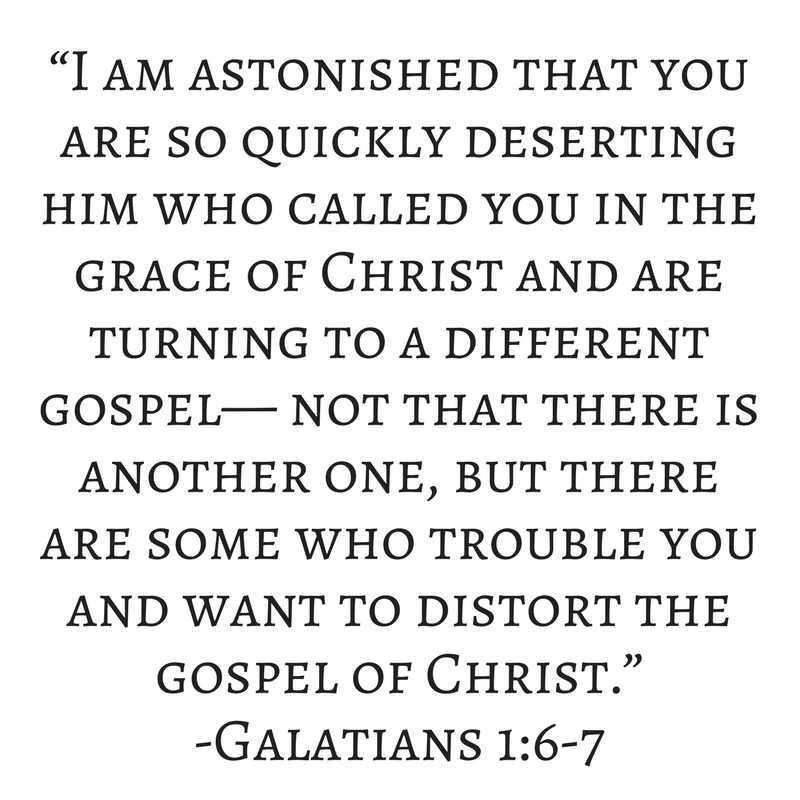In Galatians 1:6-9, Paul warns us of false gospels. The real gospel is based on Christ alone, faith alone, grace alone, is found in Scripture alone, and is for the glory of God alone.
There is only one true gospel, but there are countless false gospels that have come and gone through the ages. But what about today? What are some common false gospels that are trying to creep into churches?
Below are 5 false gospels seen in the world today.
The Prosperity Gospel
The prosperity gospel claims that if your trust Jesus, pray the sinners prayer, or do some act of faith the preacher is prescribing from the pulpit, you will be blessed on this earth and in this lifetime with material blessings and health like you never could have dreamed.
Common verses taken out of context include Matthew 7:7, Romans 8:28, Ephesians 3:20, Jeremiah 29:11, Malachi 3:10, and many more Bible passages that talk about blessings. If you trust God more by giving money to the pastor, church, or ministry proclaiming this false gospel, the prosperity preacher promises you will be blessed.
The Bible promises God will bless believers immensely, but the main blessing of the true gospel is a restored relationship with God through Jesus Christ for God’s glory, not our earthly comforts. The gospel is based on grace and received through faith. Healing from cancer, millions of dollars, and “glory stories” of earthly success are all real blessings from God for some people. But the true promised reward of the gospel is God himself with you in triumphs and trials.
The Suffer for Success Gospel
This false gospel found creeping into many churches today is similar to the prosperity gospel in that rewards are not rooted in grace but in person’s acts of faith. The “suffer for success gospel” claims that if you work hard for Christ, don’t turn from him in times of trial, and put up with a dark world that is constantly trying to persecute you, then you will be exalted in God’s eyes and given spiritual power and ministry success. “Suffering for Jesus” is the mantra. Nothing will come easy, but if you really seek God really hard, your name will definitely be remembered in the Christian history books.
Common verses taken out of context include Paul’s suffering (2 Corinthians 11), Daniel in the lion’s den (Daniel 6), Shadrach, Meshach and Abednego getting thrown into the fire (Daniel 3), and other stories of suffering that resulted in miraculous deliverance. This type of preacher will need to be very motivating and captivating because there message seems so unappealing they claim it must be the truth, and if you believe the truth God will bless you.
While following Jesus will cost us dearly, suffering is not a means to personal success. God blesses people with power through his grace. No one deserves power or success. He often does wait until we are mature enough to handle such spiritual power, but fasting, praying for days in a row, or other spiritual abusiveness to self is not a means of true grace.
The Poverty Gospel
The poverty gospel is similar to the “suffer for success gospel” in that trials, persecution, and pain are often emphasized from the pulpit. However, this type of false teaching basically demonizes material blessings, earthly success, and anything that might tempt someone into worldliness.
 The sacrificial nature of this teaching makes it seem true, but God does not demand his saints to take a vow of poverty. Common verses taken out of context include those like Matthew 19:21 where Jesus said to the young rich man “If you would be perfect, go, sell what you possess and give to the poor, and you will have treasure in heaven; and come, follow me.” The poverty gospel preacher neglects the context of such verses, missing the fact that Jesus said this to a specific person who had a love for money. God could tell anyone of us the same thing he told this young rich man, all should be willing to answer such a call, but God does not ask us all to do this.
The sacrificial nature of this teaching makes it seem true, but God does not demand his saints to take a vow of poverty. Common verses taken out of context include those like Matthew 19:21 where Jesus said to the young rich man “If you would be perfect, go, sell what you possess and give to the poor, and you will have treasure in heaven; and come, follow me.” The poverty gospel preacher neglects the context of such verses, missing the fact that Jesus said this to a specific person who had a love for money. God could tell anyone of us the same thing he told this young rich man, all should be willing to answer such a call, but God does not ask us all to do this.
While the Bible constantly warns us not to idolize money, it also tells us to enjoy all the blessings God has given us (1 Timothy 6:17). We must be generous, but giving so much that we are in poverty ourselves in not biblical (2 Corinthians 8:13).
The poverty gospel is appealing to many today because there is a “minimalist” movement currently spreading through the Western World. The true gospel, however, is not based on how much you can give up for God but rather how much he gave up for us. God loves a cheerful giver, thus there is no formula for how much each Christian should give (2 Corinthians 9:7).
The “God Is Love Only” Gospel
Another false gospel often found throughout churches today is the “God is Love Only” gospel. In this false gospel preachers emphasize the “unconditional love” of God, the “endless grace” of God, and the “always forgiving” Father.
In their proper context, truths like these are absolutely biblical. But preaching one truth at the expense of another always leads to heresy. If you only talk about the love of God and never preach on the holiness, justice, or wrath of God, you are presenting an incomplete picture of the Lord. A church in the false “God is love only” gospel will say that correcting others, church discipline, and “rule following” are unacceptable. “Acceptance,” “come as you are,” and “diversity” are buzz words used to shame anyone with a more conservative view, claiming that if you preach anything but the love of God you clearly are not accepting or diverse.
Bible verses commonly taken out of context include 1 John 4:8, Romans 5:20, Psalm 103:10-14. While the true gospel preacher will emphasize the love of God, he will be sure to express that love in context.
God does not love us so much he overlooks our sins, accepts us no matter our behavior (meaning he approves of us, even our sin, no matter what), and will thus always be happy with us no matter what we do. He loves us so much he pays for our sin himself. God always loves people no matter what they do because he is love, but he expresses that love in many different ways, including discipline, consequences, and trials meant to break us so we will turn to him. Hell is real and people really are punished for their sin if it is not covered by the blood of Jesus.
The Christ-less Cult Gospel
Cults are religious groups who twist the truth about Jesus Christ. Sadly, many cults claim to be Christian. They are not true Christians, however, because their beliefs and teachings about Jesus Christ are wrong. Christ-less churches often have an emphasis on “reaching your full potential,” “being the best you can be,” and “Jesus is our example.”
Any church that teaches Jesus was not fully God and fully man, sent from heaven to die on the cross for our sins, raised from the grave on the third day, and ascended into heaven is not a true church and is led by a false prophet. Any church that preaches something contrary to what the Bible says about Jesus is a false church and preaches a false gospel. 1 John 4:1-3 explains:
Beloved, do not believe every spirit, but test the spirits to see whether they are from God, for many false prophets have gone out into the world. 2 By this you know the Spirit of God: every spirit that confesses that Jesus Christ has come in the flesh is from God, 3 and every spirit that does not confess Jesus is not from God. This is the spirit of the antichrist, which you heard was coming and now is in the world already.
John was writing to a church that was being attacked by false teachers called Gnostics. There were false gospel then, and there are false gospels today. As Christians we must be careful to protect true gospel preaching in our churches and to add nothing but what the Scriptures teach us about the gospel.
(Below are 9 other false gospels as described by Trevin Wax, written for the Gospel Coalition.)
Therapeutic Gospel: Sin robs us of our sense of fullness. Christ’s death proves our worth as humans and gives us power to reach our potential. The church helps us find happiness.
Formalist Gospel: Sin is failing to keep church rules and regulations. Christ’s death gives me an agenda, so I can begin to follow the predescribed forms of Christianity.
Moralist Gospel: Our big problem is sins (plural) and not sin (nature). The purpose for Christ’s death is to give us a second chance and make us better people. Redemption comes through the exercise of willpower with God’s help.
Judgmentless Gospel: God’s forgiveness does not need to come through the sacrifice of His Son. Judgment is more about God’s goodness, not the need for human rebellion to be punished. Evangelism is not urgent.
Social-Club Gospel: Salvation is all about finding fellowship and friendship at church. The gospel is reduced to Christian relationships that help us enjoy life.
Activist Gospel: The kingdom is advanced through our efforts to build a just society. The gospel’s power is demonstrated through cultural transformation, and the church is united around political causes and social projects.
Churchless Gospel: The focus of salvation is primarily on the individual, in a way that makes the community of faith peripheral to God’s purposes. The church is viewed as an option to personal spirituality, or even an obstacle to Christlikeness.
Mystic Gospel: Salvation comes through an emotional experience with God. The church is there to help me feel close to God by helping me along in my pursuit of mystical union.
Quietist Gospel: Salvation is about spiritual things, not secular matters. Christianity is only about individual life change and is not concerned with society and politics.
